
Syllabus for 2D Animation Principles Class
- Subject:
- Arts and Humanities
- Graphic Arts
- Material Type:
- Syllabus
- Provider:
- CUNY Academic Works
- Provider Set:
- City College
- Author:
- Newton, Pilar C
- Date Added:
- 10/01/2020

Syllabus for 2D Animation Principles Class
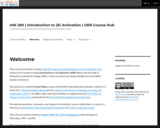
This course hub website contains OER/ZTC (Open Educational Resources/Zero Textbook Cost) resources for faculty teaching Introduction to 2D Animation (MMP 260) at the Borough of Manhattan Community College (BMCC). These resources are freely available for use by BMCC faculty and beyond.
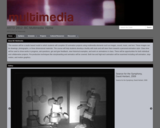
This session will be a studio based model in which students will complete 2D animation projects using multimedia elements such as images, sound, music, and text. These images can be drawings, photographs, or three dimensional materials. The course will help students develop a facility with tools and will steer them towards a personal animation style. Class time will be used to show works in progress, ask questions, get and give feedback, view historical examples, and work on animations in class. There will be opportunities for both individual and collaborative projects. Pre-production techniques like storyboarding and animatics will be covered. Both low and high-tech animation will be examined including cell animation, stop-motion, and motion graphics.
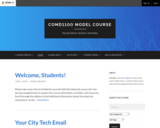
Model course site for COMD1100 Graphic Design Principles 1 at CUNY's New York City College of Technology.
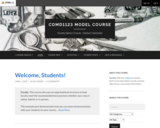
An introductory course designed to explore the basic tools, techniques and principles of drawing. The course also covers projection systems, plans, elevations, sections, oblique, isometric, one point perspective and two point perspective views. Students learn to further render forms and texture through analysis of light and shadow and by utilizing the 5-value system
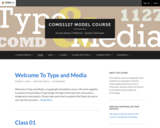
A foundation course in typography with emphasis on using type in industry related applications from print to interactive. Students will be introduced to principles of type design and terminology
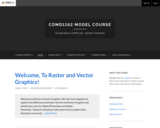
This openly available model course contains course information, learning outcomes, suggested weekly topics and projects, video resources, quizzes, and more. It may be cloned and adapted by any faculty member teaching this course.
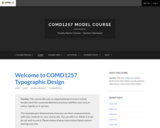
Introduces a variety of basic layouts and formats are introduced, building technical and practical fluency in setting and working with type for both print and screen. This course further explores topics learned in COMD1167 Type and Media, such as the typeface selection, and the use of the typographical grids. Problem-solving for most common typographical problems is discussed.
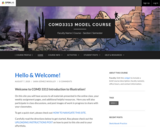
This openly available model course contains course information, learning outcomes, suggested weekly topics and projects, video resources, quizzes, and more. It may be cloned and adapted by any faculty member teaching this course.
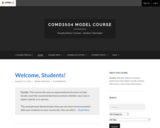
An in-depth introduction to communication design theory, this course examines theoretical perspectives of design practice within the larger discourse of design and visual culture.
Communication models, the nature of representation, the dimensions of context, and semiotics are explored through critical readings in key documents from the early decades of the twentieth century to the present.
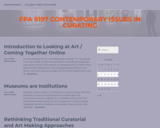
Contemporary Issues in Curating will offer an introduction to curatorial practice, examining the processes of exhibition-making from intersectional, cultural, theoretical, and pragmatic perspectives. Since the Coronavirus has greatly altered the way we produce and consume culture, this class will consider ways in which making, showing and experiencing art beyond the “white cube” might be reimagined. The course will look at historical and contemporary examples of curatorial practices that rethink modes of accessibility and equitable spaces. As more and more cultural programs have moved online, we will question and participate in this realm using the Baruch College Art Collection to organize a digital exhibition that is then collectively designed to operate within this networked, screen-based culture.
This course will prepare you to think through and respond critically to historic and emerging cultures of curating and museum cultures. You will have the opportunity to analyze the field of curating and respond to what makes a “good” curator in the 21st century. You will not only learn to criticize but to understand why museum apparatuses of display and certain art historical cannons exist. Using the Baruch College Art Collection, you will curate an exhibition, articulating and communicating artwork for various public audiences, while understand the basics of digital software to organize an online project for which you can use in your professional portfolio.
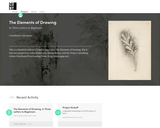
This is a Manifold edition of John Ruskin's 1907 The Elements of Drawing. The E-text was prepared by Juliet Sutherland, Marius Borror, and the Project Gutenberg Online Distributed Proofreading Team (http://www.pgdp.net).
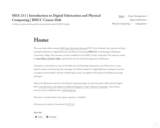
This course hub website contains OER (Open Educational Resources)/ZTC (Zero Textbook Cost) resources for faculty teaching Introduction to Digital Fabrication and Physical Computing (MEA 211) at the Borough of Manhattan Community College. These resources are freely available for use by BMCC faculty and beyond.
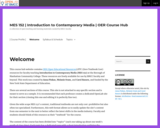
This course hub website contains OER (Open Educational Resources)/ZTC (Zero Textbook Cost) resources for faculty teaching Introduction to Contemporary Media (MES 152) at the Borough of Manhattan Community College. These resources are freely available for use by BMCC faculty and beyond.
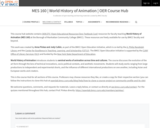
World History of Animation introduces students to seminal works of animation across time and cultures. The course discusses the evolution of the art form through the lens of technical innovations, socio-political contexts, and aesthetic movements. Students will study works ranging from large productions to independent and experimental shorts, and the influence of different international productions on one another, including Asian and European works and creators.
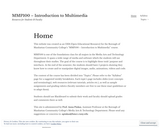
This website was created as an OER (Open Educational Resource) for the Borough of Manhattan Community College’s “MMP100 – Introduction to Multimedia” course. [...] The content of the course has been divided into “Topics”. Please refer to the “Syllabus” page for a suggested weekly breakdown. Each topic’s page includes slides (core concepts and terminology), web resources (relevant tutorials, articles etc.), as well as sample assignments and grading rubrics (faculty members are free to use these exact guidelines or to adapt them). [...] This site is administered by Prof. Anna Pinkas, Assistant Professor at the Borough of Manhattan Community College’s Media Arts & Technology Department. Please send any suggestions or concerns to: apinkas@bmcc.cuny.edu
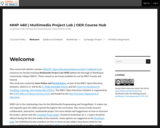
This course hub website contains OER/ZTC (Open Educational Resources/Zero Textbook Cost) resources for faculty teaching Multimedia Project Lab (MMP 460)at the Borough of Manhattan Community College (BMCC). These resources are freely available for use by BMCC faculty and beyond.

This course is a continuation of 21F.801. It focuses on expanding communication skills and further development of linguistic competency using a variety of authentic sources, such as the Internet, audio, video, and printed materials, to help develop cultural awareness and linguistic proficiency. This course is conducted entirely in Portuguese.

This assignment is inspired by the learnings that arose from the workshop, “Fostering Play in the Classroom - Pedagogies to Build Creativity, Connection and Light to Oppressive Spaces”. Based on group dialogue, feedback, and the desire to build on pedagogies of play in the workshop, this science fiction short story assignment has been created as an additional layer of liberatory, contemplative learning for students that can be used/tweaked to work in a variety of courses. Powerful conversations arose in the workshop surrounding power/oppression, positionality and how this impacts our ability to engage in play, and the importance of holding both/and (i.e. - joy/sadness, pain/pleasure, restriction/liberation). This assignment attempts to deepen these reflections through creativity, storytelling, and removal of limits for dreaming in a world with obstacles.

This Prof-Proof-Planner is designed by Professors Marta Cabral (College of Staten Island) and Niyati Mehta (Queensborough Community College) to help students navigate syllabi, regardless of how dis/organized, un/clear, or fluid/ strict/ they may be. The goal is for students to take the time to digest the essential information as they take note of it on this planner, jot down due dates, characteristics of each assignment (in terms of effort/ time required, group/individual, etc.), how to contact instructors, characteristics of each course, etc. Throughout the planner there are short reminders that each student is encouraged strive to make meaningful connections between each assignment/ course and their personal and professional interests, and there are places to write down these reflections and notes. We welcome feedback, as we would love to keep adapting this tool to our students’ needs!